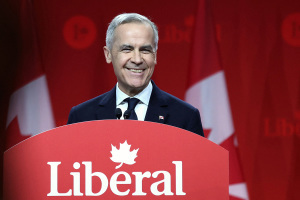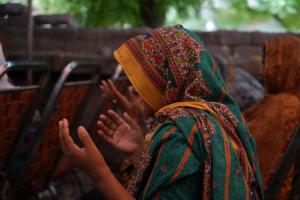Missionaries Experience a World of Danger
In the best of times, the risks may include lawlessness, unfriendly governments and the suspicion accorded to outsiders. But as the United States confronts Islamic fundamentalism and prepares to attack Iraq, it seems an especially bad time to be a Christian missionary overseas.
Yet in Virginia Beach, David and Deborah Hamilton and their two youngest children are preparing to give up their suburban life to minister in Madagascar, an island nation in the Indian Ocean.
And despite the killings in December of three Baptists working in a hospital in Yemen, the Richmond-based International Mission Board is still sending Southern Baptist missionaries to the Middle East.
``It comes down to faith: Is it something that's real or a game I play? To me, it is real, and if it's real, it requires a commitment,'' said an IMB missionary who works with Arabs. ``My job as a Christian is to show God to the world and explain to the world who Christ is.''
The potential danger is so great that the man, who is going back to the Middle East, asked that he not be identified. He is afraid the information could make him a target for hostile Muslim fundamentalists.
``I'm not a martyr by any means, and I'm not naive, either,'' he said. But he is convinced: ``If you have people like Osama bin Laden over there, there is no way you're going to change their ideals and policies, except by sharing with them a message of love and truth and praying that God will change their hearts.''
It could be argued that foreign missionaries are outmoded in modern times.
Secular agencies such as the Peace Corps and Doctors Without Borders now provide the kind of aid that once came largely from missionaries. International broadcasting by Christian television and radio stations beams evangelical messages deep into the foreign lands that missionaries traditionally sought to penetrate.
The role of missionary also carries some historical baggage. In the 1800s and early 1900s, many Americans and Europeans believed that the so-called ``white man's burden'' was to ``civilize'' foreign cultures by imposing Western customs, including Christianity. Evangelization often preceded or accompanied colonialism and imperialism.
But the modern mission field, aware of that past, follows a conspicuously different paradigm.
Most notably, nearly 90 percent of the world's 434,000 missionaries are Christians from Africa, Asia and South America, said Jonathan Bonk, the executive director of the Overseas Missions Studies Center in New Haven, Conn. About 10 percent are from the United States or Canada.
Most missionaries also receive ``cross-cultural'' training. At its Missionary Learning Center near Richmond, the IMB teaches novices to respect local mores, shun politics and avoid aggressive evangelizing when inside a foreign country.
``We want to be and seek to be very respectful of our host and treat them with respect. In fact, Jesus Christ requires us to treat others as we'd have them treat us,'' said Michael Edens, an IMB missionary who spent 22 years in the Middle East.
Protective of their religion and suspicious of the West, some Islamic countries might seem a hornet's nest better left alone by Americans devoted to spreading Christianity.
Yet those countries' need for developmental aid exceeds what they can get from nonreligious international agencies. As a result, even Middle Eastern governments will admit foreigners, such as the Baptists who provided health care in Yemen.
For missionaries, such access allows them to model Christianity while helping people in practical ways. As they do that, personal relationships grow and strengthen into friendships.
Every missionary hopes those connections will elicit questions about why they have come so far and act so selflessly.
``That opens windows of opportunity to witness to who Christ is, and that Christians are not the demons we're made out to be,'' said the missionary who is returning to the Middle East.
Spreading knowledge about Christianity in this way, he said, is neither coercive nor a violation of governmental bans on blatant evangelism. ``Living a Christian life and looking for opportunities to show the truth of the gospel -- to me, that's not proselytizing.''
Though this ``friendship evangelism'' works well among individuals with whom a missionary deals directly, it may not stop people outside that circle from viewing the missionary as a Westerner with suspect motives.
Several missionaries who have served in Asia, South America and the Middle East said a U.S. attack on Iraq could heighten that skepticism toward Americans.
``Their interpretation will be that the U.S. is interfering, and I think the question of whether it's an `oil war' will come up strongly,'' said Malcom Massey, an associate pastor at Ocean View Baptist Church who was a missionary in Bolivia and Costa Rica for five years.
Nonetheless, David and Deborah Hamilton aren't worrying about their reception in Madagascar, an African country that welcomes Christian evangelists.
``If not for God, we could not do this. If not for God, I would not consider doing this,'' said David, an engineering analyst with a naval architectural firm.
David, 45, and Deborah, 42, never planned to be missionaries. The couple have three children, two of whom are still young enough to be home-schooled by Deborah. The family attends the Episcopal Church of the Messiah in Chesapeake.
But one day in 1997, a neighbor dropped in and described her own, recent short-term mission trip.
``While she was sharing, I just felt that the Lord was impressing upon me that I should pray for my husband to receive a heart for missions,'' Deborah said.
Deborah prayed for two years before confessing her inspiration to David. He was intrigued, and enrolled in a church-sponsored course on the Christian mandate to share the gospel far and wide.
After several weeks, David came home from class one night with news -- good and bad.
``He said, `The good news is that, yes, the Lord has given me a heart for missions. The bad news is, it's not just for me, but for the whole family,' '' Deborah recalled. ``That really caught me off guard.''
But Deborah gradually became convinced that God wanted her, too, as a missionary.
The couple are also convinced that God is responsible for the dreams and coincidences that repeatedly and distinctly pointed to Madagascar as their destiny.
The cost of following God's will is high. While the Hamiltons will get training and credentials from the Episcopal World Mission, they must raise all the money needed to support the family in Madagascar. They will sell their house. David will quit his job. There will be a long separation from the 19-year-old son who's staying behind to attend college.
Yet the Hamiltons say they have no alternative but to go.
``God does not just give you confirmation,'' David said. ``God does not just make everything work so you can go. God breaks your heart for the people whom his heart breaks for.''
By Steven G. Vegh





























